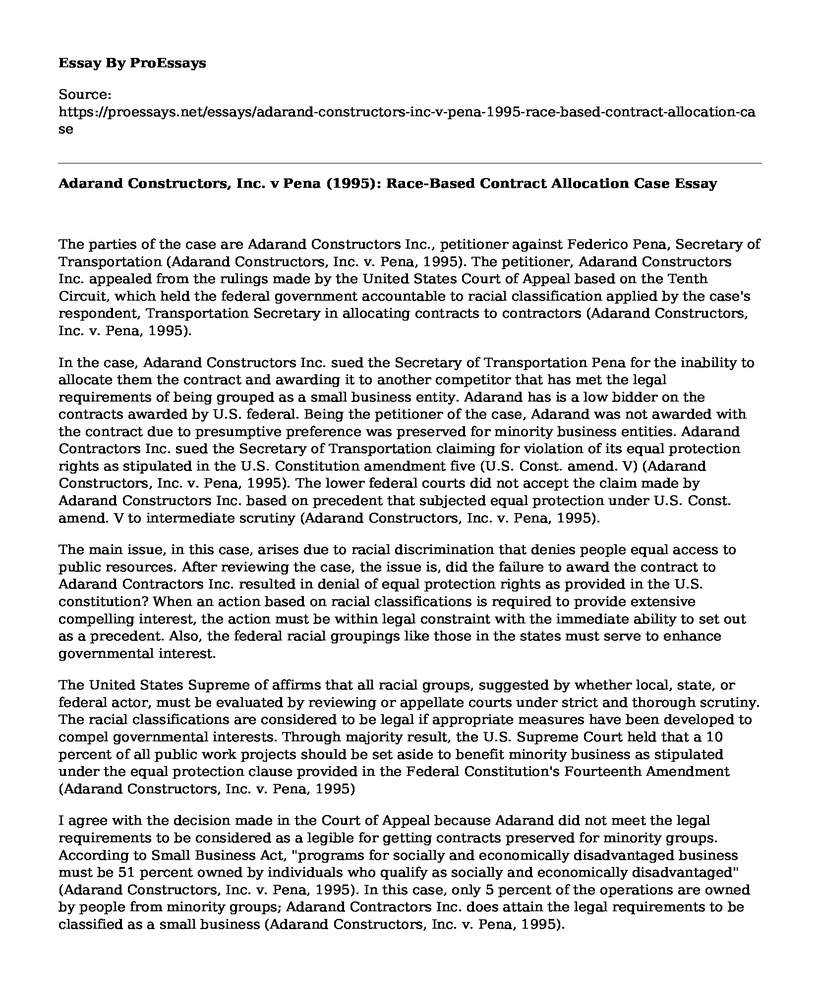The parties of the case are Adarand Constructors Inc., petitioner against Federico Pena, Secretary of Transportation (Adarand Constructors, Inc. v. Pena, 1995). The petitioner, Adarand Constructors Inc. appealed from the rulings made by the United States Court of Appeal based on the Tenth Circuit, which held the federal government accountable to racial classification applied by the case's respondent, Transportation Secretary in allocating contracts to contractors (Adarand Constructors, Inc. v. Pena, 1995).
In the case, Adarand Constructors Inc. sued the Secretary of Transportation Pena for the inability to allocate them the contract and awarding it to another competitor that has met the legal requirements of being grouped as a small business entity. Adarand has is a low bidder on the contracts awarded by U.S. federal. Being the petitioner of the case, Adarand was not awarded with the contract due to presumptive preference was preserved for minority business entities. Adarand Contractors Inc. sued the Secretary of Transportation claiming for violation of its equal protection rights as stipulated in the U.S. Constitution amendment five (U.S. Const. amend. V) (Adarand Constructors, Inc. v. Pena, 1995). The lower federal courts did not accept the claim made by Adarand Constructors Inc. based on precedent that subjected equal protection under U.S. Const. amend. V to intermediate scrutiny (Adarand Constructors, Inc. v. Pena, 1995).
The main issue, in this case, arises due to racial discrimination that denies people equal access to public resources. After reviewing the case, the issue is, did the failure to award the contract to Adarand Contractors Inc. resulted in denial of equal protection rights as provided in the U.S. constitution? When an action based on racial classifications is required to provide extensive compelling interest, the action must be within legal constraint with the immediate ability to set out as a precedent. Also, the federal racial groupings like those in the states must serve to enhance governmental interest.
The United States Supreme of affirms that all racial groups, suggested by whether local, state, or federal actor, must be evaluated by reviewing or appellate courts under strict and thorough scrutiny. The racial classifications are considered to be legal if appropriate measures have been developed to compel governmental interests. Through majority result, the U.S. Supreme Court held that a 10 percent of all public work projects should be set aside to benefit minority business as stipulated under the equal protection clause provided in the Federal Constitution's Fourteenth Amendment (Adarand Constructors, Inc. v. Pena, 1995)
I agree with the decision made in the Court of Appeal because Adarand did not meet the legal requirements to be considered as a legible for getting contracts preserved for minority groups. According to Small Business Act, "programs for socially and economically disadvantaged business must be 51 percent owned by individuals who qualify as socially and economically disadvantaged" (Adarand Constructors, Inc. v. Pena, 1995). In this case, only 5 percent of the operations are owned by people from minority groups; Adarand Contractors Inc. does attain the legal requirements to be classified as a small business (Adarand Constructors, Inc. v. Pena, 1995).
The reasoning, in this case, was based on the fact that equal protection clause makes a recommendation that a prime contractor must receive additional benefits for subcontractors recognized by the law and owned by "socially and economically disadvantaged individuals" (Adarand Constructors, Inc. v. Pena, 1995)
Work Cited
Adarand Constructors, Inc. v. Pena, 515 U.S. 200, 115 S. Ct. 2097, 132 L. Ed. 2d 158 (1995). Retrieved from: https://scholar.google.com/scholar_case?case=2147006255844490323&q=Adarand+Constructors+v.+Pena&hl=en&as_sdt=2003
Cite this page
Adarand Constructors, Inc. v Pena (1995): Race-Based Contract Allocation Case. (2023, Apr 10). Retrieved from https://proessays.net/essays/adarand-constructors-inc-v-pena-1995-race-based-contract-allocation-case
If you are the original author of this essay and no longer wish to have it published on the ProEssays website, please click below to request its removal:
- Gun Control Debate Essay
- Types of Threats Posed to the United States - Case Study Example
- Torres Vs Trivino - Paper Example
- Retributive Justice Essay Example
- Criminal Justice: Upholding Social Equality and Redressing Injustice - Research Paper
- Essay on Voters' Healthcare Priorities: ACA vs. HEART Ahead of 2020 Election
- Criminal Labels: The Worst Consequence of Conviction - Research Paper







